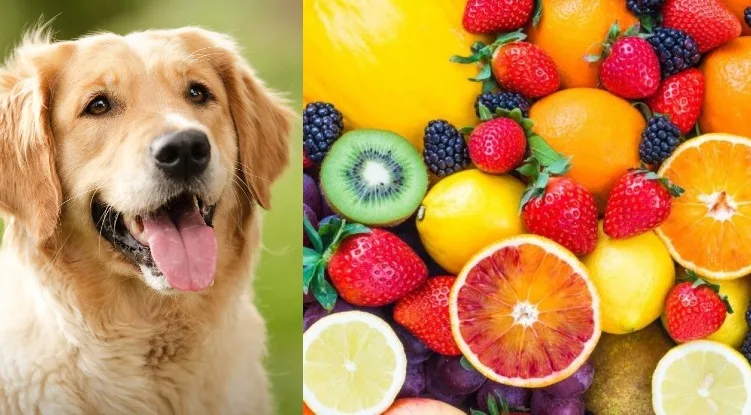As dog owners we want our dogs to be healthy. We give them high-quality food, we buy them delicious but nutritional treats and we even share some fruits and vegetables with our four-legged friends. But have you ever asked yourself the question of what fruits can dogs eat actually?
Are all the fruits that are healthy for us humans safe for our dogs? The answer is no! It’s important that you educate yourself on the fruits your dog can eat, and all the ones that you should never give your dog!
I’ve made a list for you of all the fruits dogs can eat and the ones you should absolutely never give to your dog!
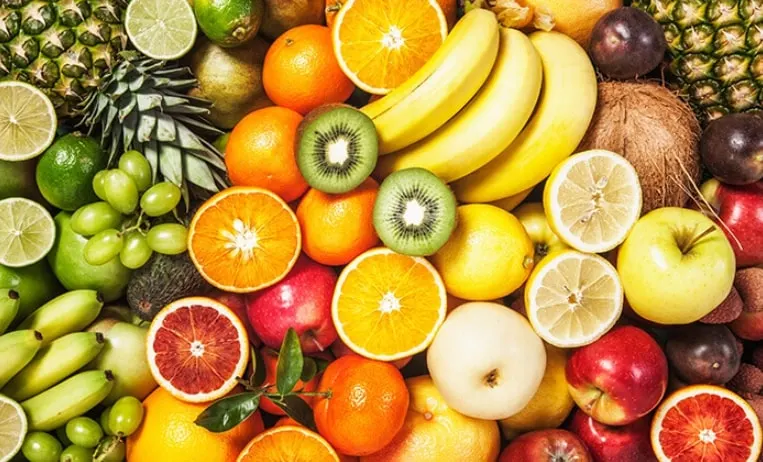
What fruits can dogs eat
Like mentioned not all the fruits that are very healthy and beneficial for us humans are safe for our dogs so the list of what fruits can dogs eat might not be as long as you think. Some fruits that humans digest just fine can cause severe health problems for your dog. However, there are fruits that provide a number of health benefits for your dog such as joint strength, better breath, and allergy immunity.
Let’s first see which ones you can give your dog without any guilt and that are actually beneficial for your furbaby’s health!
Can dogs have bananas?
Bananas are a great snack for humans, so many people wonder can dogs eat bananas and are bananas good for dogs or are bananas bad for dogs? The answer is dogs can eat bananas, this fruit is actually very good for your dog!
Bananas are a healthy low-calorie treat for dogs because they are high in potassium, vitamins, biotin, fiber, and copper. Bananas are full of sugar, so please give your dog bananas in moderation.
Also read: Which Food Is Good Or Bad For Dogs?
Can dogs eat nectarines?
Nectarines are a sweet summer fruit, can dogs have nectarines? Are nectarines safe for dogs or should you better not give them to your dog?
Unlike fruits like grapes, nectarines are safe for dogs, but if given in moderation. This fruit is rich in vitamins A and C, magnesium, potassium, and dietary fiber. However, they are also full of sugar.
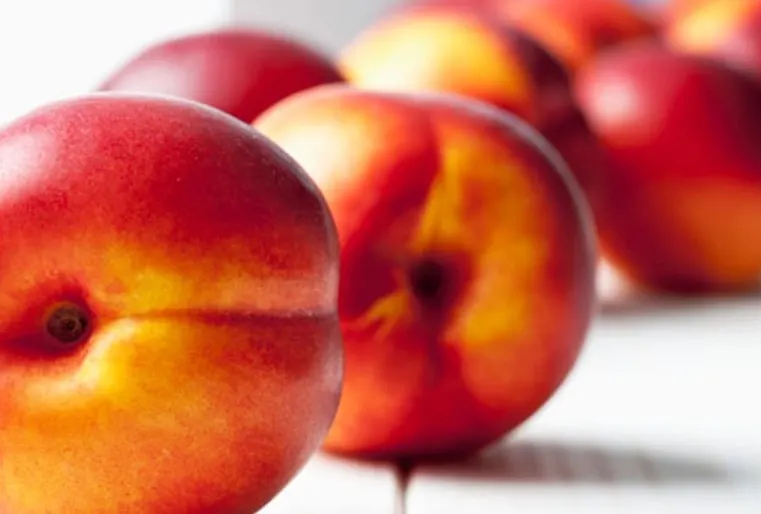
Because of this, the portion sizes you give your dog should be kept very small. The high sugar content can be potentially bad for your dog’s health.
Now, the question is are nectarines beneficial for dogs? As mentioned above, nectarines are full of Vitamin C, however, dogs’ bodies are already capable of producing the vitamin C they need. This means that offering fruits like nectarines isn’t really necessary.
Can dogs have blackberries?
Blackberries are a perfectly safe fruit for your dog. So the answer is yes, dogs can have blackberries. Unlike bananas for example blackberries are low in calories and sugar!
Blackberries are great because they contain anthocyanins, which fights free radicals and has anti-inflammatory and anti-viral effects. It also reduces the risk of heart disease and cancer and improves brain function! Blackberries are packed with different vitamins such as vitamins A, B, C, E, and K too! A lot of Omega-3 fatty acids can be found in blackberries too, which are crucial for a shiny coat, healthy skin, and strong teeth!
Can dogs have blueberries?
Blueberries are a superfood rich in antioxidants. They are great for preventing cell damage in humans, but can dogs eat blueberries? Yes, dogs can and should eat blueberries! Owners also wonder are blueberries good for dogs. And the answer to this question is also yes! Blueberries are very good for your dog.
Many experts advise dog owners to incorporate blueberries into their dog’s diet. This is because blueberries are rich in fiber which aids in serving a boost to the digestive system of dogs. Believe it or not, blueberries will even keep your dog young. This is because they protect your dog’s body cells from damage, reduce inflammation, and protect against age-related cognitive decline. So if you’ve been wondering are blueberries bad for dogs, wonder no more!
Can dogs have strawberries?
Strawberries are a great summer treat. These little red fruits bring us humans so much joy, but can dogs eat strawberries? This is a big yes too, dogs can eat strawberries!
But, are strawberries good for dogs and why? Well, strawberries are actually packed with powerful nutrients that support your dog’s health! Just like blueberries, they are too full of antioxidants.
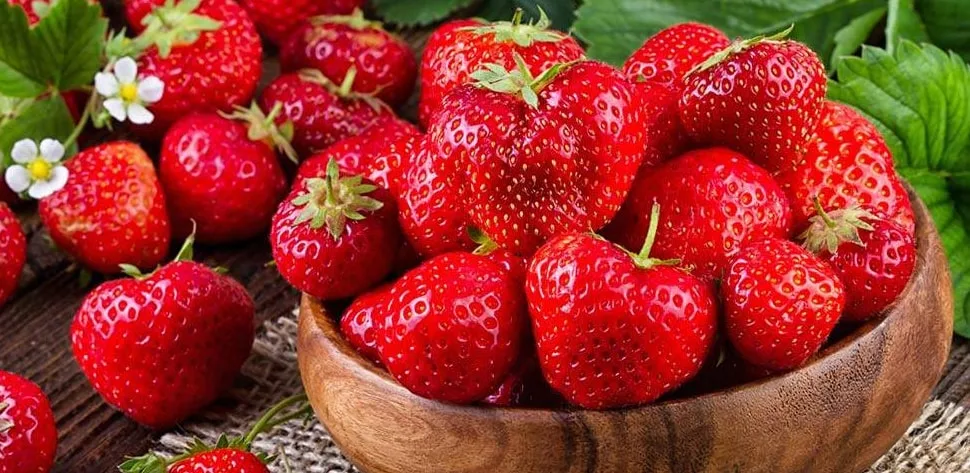
But besides this, they are low in calories and provide dietary fiber which is very important in your dog’s diet. Another plus is that strawberries are a great source of vitamin C, and they contain Malic Acid that will make your dog’s teeth white! A win-win overall!
Can dogs have watermelon?
Another popular summer fruit for us humans is watermelon. But can dogs eat watermelon, is watermelon good for dogs, is watermelon bad for dogs? What’s the truth, after all, they are made out of 92 percent water, so it should be healthy right? The answer to this question is a big yes as well! Watermelon is great for your dog because it’s low in calories and packed with nutrients such as potassium and vitamin A which is good for eye, cell, and immune health. Besides this, it contains vitamin B6 which keeps your dog’s coat shiny and strong. Also, watermelons are full of vitamin C that can keep allergens and sniffles under control!
Can dogs have oranges?
As a dog owner at some point or another, you’ve probably wondered can dogs eat oranges or are oranges good for dogs? The answer to both questions is yes!

Oranges are an excellent source of vitamin C, potassium, and fiber, and in small quantities, the juicy flesh of an orange can be a tasty treat for your dog. Of course, always make sure you peel the orange as the peel can be difficult for your dog to digest.
Can dogs eat tangerines?
Just like oranges, tangerines are a delicious citrus fruit. But can dogs have tangerines, are tangerines safe for dogs?
Generally speaking, tangerines are safe for dogs to eat! They are very healthy, full of vitamin C, folate, beta-carotene, potassium, and other nutrients! Tangerines also have a high water content, which makes them a healthier alternative to some treats you might be giving your dog.
However, these fruits are also full of sugar, so you might want to keep the amounts you give your dog in moderation.
Can dogs have pineapple?
Pineapple is a little bit controversial when talking about it as a pizza topping. However, can dogs eat pineapple? Is pineapple good for dogs, and is it even safe for them? Yes, it is! A few chunks of pineapple is a great sweet treat for dogs as long as you remove the peel and the crown. Pineapple is a treat because it is full of vitamins, minerals, and fiber. It also contains bromelain, an enzyme that makes it easier for dogs to absorb proteins.
Can dogs have mango?
Mangos have a lot of sugar in them, so many dog owners wonder can dogs eat mangos? The answer is yes, they can. You just need to limit the amount your dog eats (just like with any other fruit). The great thing about mangos is that they are packed with four different vitamins: A, B6, C, and E. They also have potassium and both beta-carotene and alpha-carotene.
Can dogs have apples?
When answering the question of what fruits can dogs eat, we can’t forget apples. Many dog owners wonder can dogs eat apples and are apples good for dogs? The answer is without any doubt yes!
It’s completely safe and actually healthy for your dog to eat apples. Apples are a great source of vitamin C, fiber, calcium, and phosphorus. They are also amazing because they are a very safe way to satisfy your pet’s sweet tooth. Chewing an apple can even help clean your dog’s teeth!
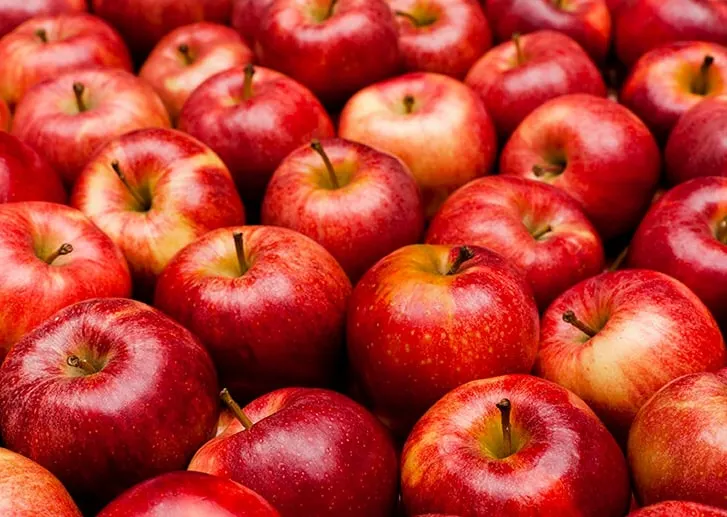
Can dogs have cantaloupe?
Yes, cantaloupe is safe for dos, if given in moderation. So if you were wondering can dogs eat cantaloupe, here’s your answer. Cantaloupe is an excellent source of dietary fiber, vitamin B6, niacin, folate, vitamin A, vitamin C, and potassium. It is also low in calories and high in water content.
Can dogs have peaches?
Some people see peaches as dangerous for dogs, but is this true, can dogs eat peaches? Yes, peaches are one of those fruits that are completely safe for your dog! Peaches are a great source of fiber and vitamin A, and can even help fight infections. However, please always make sure to remove the pit before you give peaches to your dog. Peach stones contain a sugar-cyanide compound called amygdalin which can be dangerous to dogs.
Can dogs have raspberries?
Can dogs eat raspberries is a legitimate question many dog owners ask. However, no need to worry, the answer is yes. Dogs can eat raspberries! Just like blueberries and strawberries, raspberries contain antioxidants that are great for dogs.
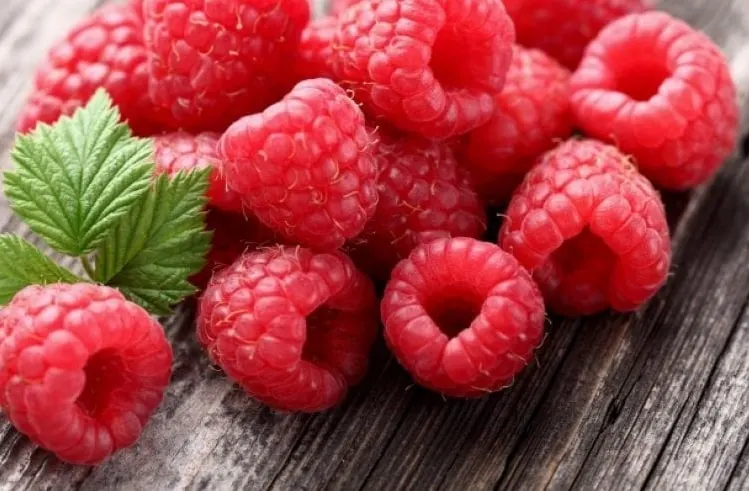
They’re very low in sugar and calories, but high in fiber, manganese, and vitamin C. Raspberries are great for senior dogs because they have anti-inflammatory properties, which can help aging joints. The reason why many dog owners are concerned about giving their dogs raspberries is that they contain small amounts of xylitol. But don’t worry, just make sure you’re not giving your dog more than a cup of raspberries at a time.
Can dogs eat cranberries?
Can dogs have cranberries? The answer is yes but also no. Generally speaking, cranberries aren’t toxic for dogs, they are a safe fruit. However, you need to be very careful with the amounts you give your dog. Veterinarians warn that feeding large amounts of cranberries to dogs can lead to the development of calcium oxalate stones in their bladders.
Can dogs eat kiwi?
Dog owners often wonder can dogs have kiwi? The answer is, you can share a piece of kiwi (make sure you cut it) with your dog without any guilt! Kiwis are loaded with vitamin C (actually more than an orange) and contain more potassium than a banana! This small fruit has so many nutritious benefits, however, humans benefit more from those nutrients in kiwi than your dog does. So use kiwi fruit just like a little snack from time to time.
Can dogs eat dragon fruit?
Pitahaya or dragon fruit is a very exotic fruit that became quite popular in the last few years. Many people who enjoy this fruit wonder, can I share it with my dog too? The answer is yes. Dragon fruit is safe for dogs and it’s full of minerals and vitamins that are excellent for dogs.
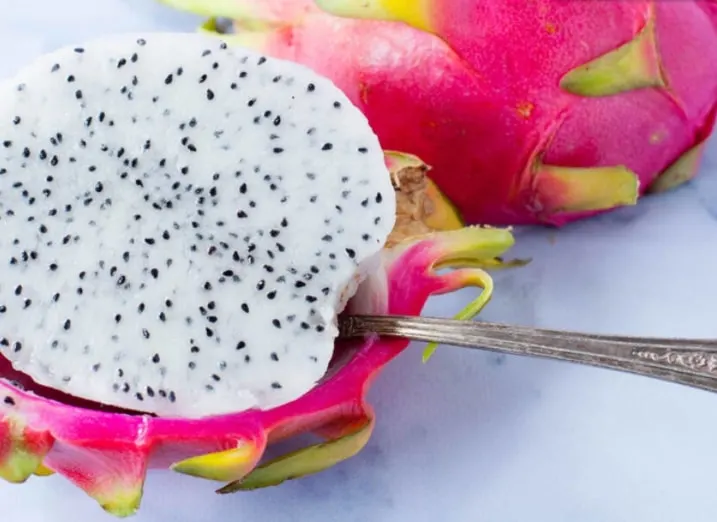
It contains Vitamin C, it’s low in calories but very high in fiber. And if you’re wondering about the seeds of this fruit, given that seeds are normally toxic to dogs. Don’t worry dragon fruit seeds are perfectly safe.
Also read: What Vegetables Can Dogs Eat?
Can dogs eat papaya
Papaya fruit has become increasingly popular in the last few years, so when talking about what fruits dogs can eat, we can’t forget to mention it too. Papaya is rich in fiber and healthy enzymes that improve digestive health. Besides this papayas contain vitamins A, C, E, and K, as well as folate, potassium, and calcium, which aids heart and immune system health. So they are really healthy for your dog!
However, before giving your dog some papaya, please make sure to remove the seeds because they can cause intestinal blockage.
Fruits that are bad for dogs
We’ve answered the question of what fruits can dogs eat and which are actually safe and healthy for your dog to eat (in moderation). However, now we need to clarify which are an absolute NO-NO and are toxic for your fur-baby. Here is a list of all the fruits (and some nuts) you should never give your dog!
Can dogs eat pomegranate
Generally speaking pomegranate isn’t poisonous for your dog. Small portions are okay for them to consume. However this fruit does tend to make the majority of dogs sick. Even though pomegranates are super healthy for humans and are high in vitamin C, potassium, folic acid and fiber, you should think twice before giving it to your dog.
Eating pomegranate might make your dog’s stomach hurt or make your dog vomit. One of the reasons why pomegranates make your dog sick is the fact that dogs aren’t able to digest seeds.
Truth be told, even though pomegranate isn’t poisonous, your dog doesn’t really have any benefits from it either. So it’s just not worth the risk.
Can dogs have grapes?
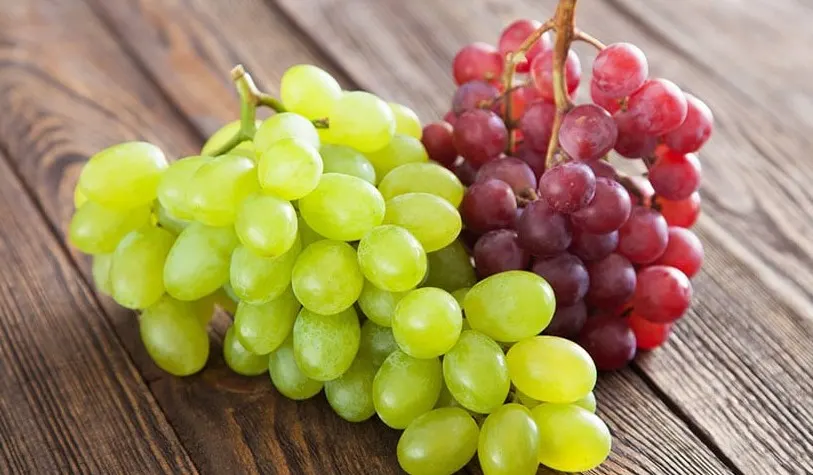
Have you ever wondered are grapes good for dogs? If yes, then you definitely need to read this! At some point or another you’ve probably heard many people say to never give your dog grapes. However, why is that, are grapes bad for dogs, and if yes why can’t dogs eat grapes?
But why are grapes bad for dogs? Well, grapes are very bad for your dog, eating them can even be fatal for your pooch! You should never give your dog grapes. Even though we humans love grapes, they can be very toxic for dogs. But why are grapes toxic to dogs? Grapes and raisins can lead to acute sudden kidney failure in dogs. That is how toxic they are!
Can dogs eat raisins?
Can dogs have raisins is another question many dog owners ask. Are raisins bad for dogs just like grapes? The truth is, raisins are just dried grapes, so no. Dogs can’t eat raisins just like they can’t eat grapes! Raisins like grapes are highly toxic to dogs and can even be fatal. Eating grapes and raisins could potentially lead to sudden kidney failure in dogs. However, research has yet to pinpoint exactly which substance in the fruit causes this reaction.
Can dogs have avocado?
Avocados have become quite popular in the last few years, especially avocado toast. So it’s to no surprise that dog owners all over the country wonder can dogs eat avocado? The answer is under no circumstances should your dog eat avocado! The reason for this is that avocados contain persin, a toxin that often causes vomiting and diarrhea in dogs. Even though the inside of the avocado doesn’t have as much persin as the pit, skin, and leaves, it is still too much for dogs to handle.
Can dogs eat cherries?
Can dogs have cherries? Well, to be honest, there is no clear answer to whether or not dogs can eat cherries. Generally speaking, the flesh of cherries is safe for dogs to eat. However, the problem with this fruit is that cherry plants contain cyanide and are toxic to dogs.
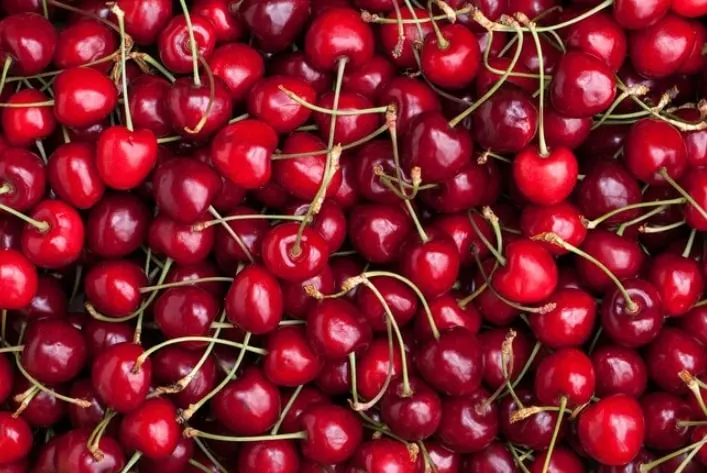
Cyanide disrupts cellular oxygen transport, which means that your dog’s blood cells can’t get enough oxygen. Theoretically, you could feed your dog a fresh cherry, but you’d have to remove the pit, stem, and any leaves first. To be completely honest with you, it’s just too much work considering your dog won’t eat enough to see any benefits from them.
Can dogs eat lemons?
Can dogs have lemon? The better question would be, why would you let your dog eat a lemon? Because their reaction is comical? Maybe reevaluate why you have a dog… Feeding your dog lemons isn’t funny! Theoretically, dogs can eat lemons, but it can cause serious digestive problems.
Can dogs eat plums?
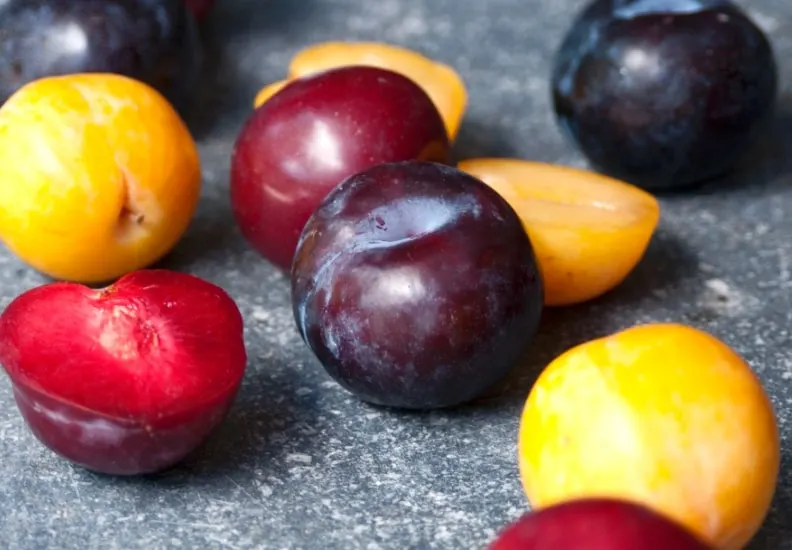
Dogs shouldn’t eat plums for several reasons. Plums aren’t toxic like grapes, however, the main issue with dogs and plums revolves mostly around the ingestion of the pit. The pit of plum can be sharp and could damage the esophagus, stomach, or intestines of a dog. Besides this, the flesh of a plum contains a lot of sugar, which isn’t recommended either!
Can dogs eat pears?
Can dogs have pears is another great question. Before giving your dog any human food you should always know whether or not that food is safe. In this case, pears are safe for your dog! But pears are not only safe for dogs, but they are also healthy! They are high in copper, vitamins C and K, and fiber. Many experts actually believe that eating pears can reduce your dog’s risk of having a stroke by even 50 percent! Amazing isn’t it?
The only thing you need to be careful about it, just like with apples, please peel them and cut them into smaller pieces before giving them to your dog. You don’t want your dog’s healthy snack to turn into a choking hazard.
Different kinds of nuts
The list of what fruits can dogs eat goes on and on, but we can’t forget another very popular human snack, nuts! Generally speaking, even though it seems like it, not all nuts are bad for dogs! However, almost all of them are very, very high in fat, which isn’t good for your dog. Too much fat can actually lead to obesity and pancreatic issues in dogs! It isn’t advisable for your dog to eat any nuts, but there are a few that are toxic!
Can dogs have almonds?
Even though almonds aren’t as toxic as some other nuts, they are still not safe for dogs to eat. Almonds are high in fat and can put your pup at risk of developing pancreatitis. They can also block your dog’s esophagus, intestines, or windpipe which can be fatal if not treated.

Now you know the answer can dogs eat almonds, however, there will be a time where you’re not paying attention to your dog and he or she might steal a few. In this case, if your dog ate almonds pay attention to these symptoms:
- Vomiting
- Diarrhea
- Gas
- Loss of appetite
- Lethargy
- General discomfort
Can dogs eat peanuts?
Dogs love peanut butter, they can’t get enough of it. But what about peanuts, are they safe for dogs too? I mean if peanut butter is safe, so should be peanuts, right? Well, it’s not really that simple. Peanuts aren’t toxic for dogs.
You can give your dog dry-roasted (or raw), unsalted peanuts. However, moderation is key! Let your dog eat just a few peanuts, and definitely not every day.
Can dogs eat pistachios?
It’s true that pistachios aren’t toxic to dogs, however, their high-fat content could make them pretty sick if they have them in large amounts! According to the ASPCA, the high-fat content in nuts like pistachios, pecans, and macadamia nuts can cause vomiting and diarrhea in dogs.
Can dogs have cashews?
Dog owners, who know that nuts aren’t the safest human foods for dogs wonder can dogs eat cashews? Cashews are a delicious snack for us humans, but can we share them with our dogs? Just like any nut cashews are high in fat, however, generally speaking, they are safe for dogs to eat, they are not toxic. Besides being high in fat, cashews are high in proteins. Because they are high in fat and protein, giving your dog a lot of cashews can lead to pancreatitis, a potentially life-threatening condition.
Can dogs eat coconut?
Coconut oil is completely safe for dogs, and many dog owners add it to their dogs’ diets. However, what about the coconut meat itself? Can dogs have coconut? The answer is yes! Coconut meat is just as healthy, if not more so than coconut oil alone. They share similar properties since they come from the same place. Coconut meat decreases inflammation, boosts your dog’s immune system and it benefits their skin!
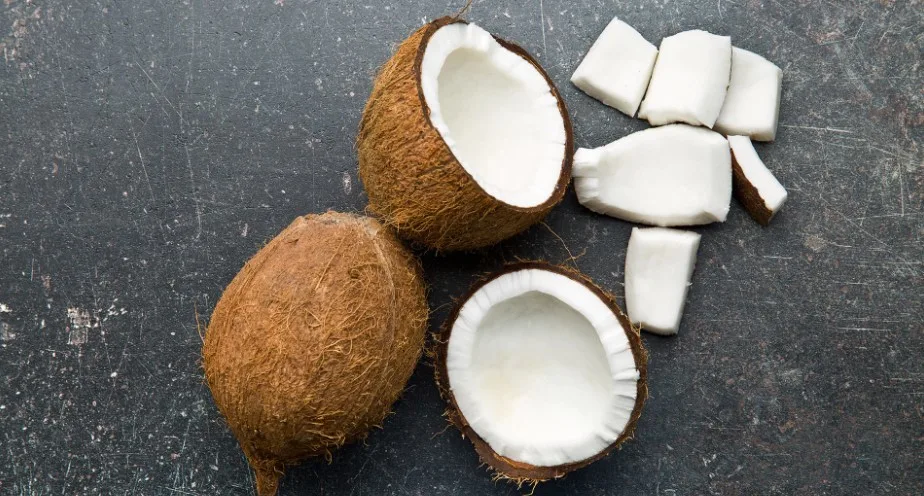
Can dogs eat pecans?
There are nuts that are okay to give your dog, but pecans are definitely not one of those! Please never give your dog pecans because they are considered to be toxic to dogs due to their ability to grow mold and lead to GI distress, intestinal blockages, or other serious symptoms like seizures!
Can dogs eat cinnamon?
Cinnamon isn’t a nut, but it’s a very common spice in households. It’s not surprising to hear that a dog got into the spice rack and stole some cinnamon. These are also the situations where dog owners frantically ask themselves is cinnamon bad for dogs? Cinnamon is not toxic for dogs, nothing bad will happen if your dog eats some.
However, this doesn’t mean you should sprinkle your dog’s food with cinnamon. This spice and even cinnamon oils can cause skin and digestive irritation and sensitization in both pets and people, especially if consumed in large quantities.
Conclusion
Dog owners worldwide wonder what fruits can dogs eat, but as you could see there are many fruits that are beneficial for dogs like strawberries, blueberries, and apples.
We also have toxic fruits like grapes, however, there is also a number of fruits that aren’t toxic but aren’t recommended for dogs either like plums.
Please always stick to the fruits and foods you know are 100 percent safe and beneficial for your dog. Don’t just give your dog fruits that are okay for us humans to eat, thinking they’ll be beneficial for your dog.
You should know with certainty what fruits can dogs eat! Generally speaking, your dog already gets all the needed nutrients from the food you give him or her (if you use high-quality food), so there is no need to experiment with fruits.

